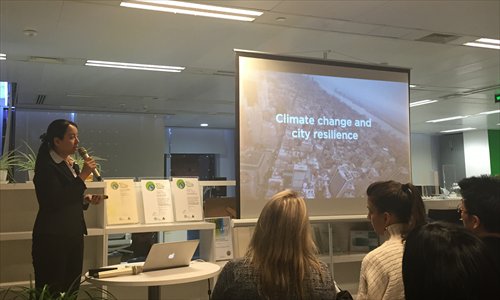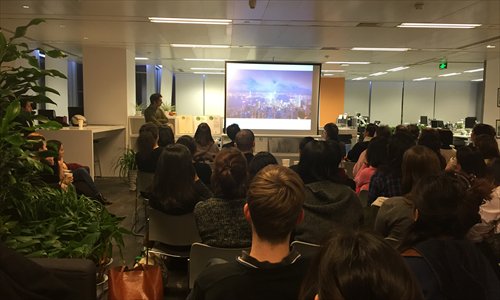HOME >> METRO SHANGHAI
Environmental stakeholders
By Wang Han Source:Global Times Published: 2015-12-21 19:03:01
"How many of you believe that Shanghai is well prepared for climate change?" asked Nitin Dani, one of the two directors of a local environmental nonprofit organization, during a recent event. Nobody in the audience raised their hands.
The shocking scene happened at the latest Green Initiatives forum, "How to Better Prepare Shanghai for Climate Change," immediately following the landmark 2015 United Nations Climate Change Conference.
While politicians from around the world gathered in Paris to commit to reducing global warming, industry professionals and environmentalists met in Shanghai for a smaller-scale but equally important discussion about climate changes effecting Shanghai.
"The overall theme of our current series of events is 'Building for the Future,'" said Dani, "We are focusing on how big data, innovative digital software, healthy building technologies, climate-resilient urban planning and other breakthrough concepts can better prepare cities for climate change as well as lead to the design of smarter and more efficient cities."
Three speakers, Elisa Xiao Jianliang, Joost van den Hoek and Wang Jingyi brought insightful ideas to the think tank, pointing out Shanghai's vulnerabilities and suggesting possible solutions from the perspective of city planning.
Unique challenges
"How can we ensure food security when Shanghai's sea level keeps rising?" Xiao, an experienced independent environmental and social consultant, asked during her lecture. She pointed out that as a coastal city, Shanghai has its own unique climate challenges.
For example, with the rising global temperature, Xiao said the sea level of Shanghai will inevitably rise, spilling into local farmlands and destroying their arability. This in turn will pose a domino-like threat to China's agricultural industries, its food security and its economy.
"If people do not think seriously of these issues, Shanghai will very likely be flooded within the next 30 years," said Xiao, adding that global warming is responsible for the frequent extreme weather in Shanghai. "It is time for stakeholders to recognize climate change is a pressing problem and take action accordingly."
Joost van den Hoek, urban planning director of urbanDATA Shanghai, gave a presentation about what Shanghai can learn from the Netherlands to avoid being flooded. He pointed out that Shanghai and Holland both are urban deltas and therefore share comparable urbanistic challenges in dealing with water and water management.
In the lecture, he presented five case studies and outlined urban planning solutions to deal with Shanghai's rising water levels. There are three types of interventions that van den Hoek believes Shanghai can borrow from Holland, including building a water square downtown for better urban water retention and multifunctional break-water and integrated sea wall to protect the city from floods.
Personal responsibility
Climate resilience generally is regarded as a government responsibility, but organizers and speakers at the forum attempted to encourage every participant to take personal responsibility and make their own contributions.
"While governments and corporations definitely have a part to play in this area and ought to be leading the change, none of it is possible through individual action," said Dani, "It is also these individuals that form governments and corporations and take key decisions that affect the lives of millions of people."
Xiao agrees that climate resilience matters to everyone. "Many people think climate resilience remains a government slogan. In fact, everyone is a stakeholder of our environment, and can jointly make a difference to our city," said Xiao.
"Actions from bottom to top are more effective than waiting for the government to implement resilience programs. If entrepreneurs and designers at tonight's forum could incorporate green ideas in their daily work, it would make real change," she said.
Members of the audience seemed to agree that everyone plays a role in climate change. "It is really easy to go away after coming to forums like this and just go back to routines of everyday life," said Sabrina who studies Chinese at Fudan University. "But tonight is a reminder for us."
"Whatever I do, I do in a way that can reach others around me and inspire a bigger group of people to change," Niels from the Netherlands told the Global Times. "For me, one way to do this is riding a bike. It is a small but meaningful thing because people can see you and do it themselves."
Growing awareness
While climate change and environmental protection are hot topics in Western countries, they are relatively new in China. However, public awareness has increased in recent years due to local and national media coverage and grass-roots activism.
"We started these kinds of events in 2009 when there was not much awareness of environmental issues in Shanghai. Back then 80 percent of our attendees were foreigners and 20 percent were Chinese, maximum 40-50 people," Dani told the Global Times.
"However, in the last couple of years our events have grown much bigger, with an average of 80-90 people, including about 50 percent Chinese. So I can see that the awareness among Chinese people is getting better, and it is only a matter of time. We just have to keep the education going."
Green Initiatives runs events every month to promote awareness of, and solutions to, environmental issues in Shanghai and China. They invite industry experts and local leaders to give talks, screen documentary films, and promote student outreach to educate China's youth about the environment.




The shocking scene happened at the latest Green Initiatives forum, "How to Better Prepare Shanghai for Climate Change," immediately following the landmark 2015 United Nations Climate Change Conference.
While politicians from around the world gathered in Paris to commit to reducing global warming, industry professionals and environmentalists met in Shanghai for a smaller-scale but equally important discussion about climate changes effecting Shanghai.
"The overall theme of our current series of events is 'Building for the Future,'" said Dani, "We are focusing on how big data, innovative digital software, healthy building technologies, climate-resilient urban planning and other breakthrough concepts can better prepare cities for climate change as well as lead to the design of smarter and more efficient cities."
Three speakers, Elisa Xiao Jianliang, Joost van den Hoek and Wang Jingyi brought insightful ideas to the think tank, pointing out Shanghai's vulnerabilities and suggesting possible solutions from the perspective of city planning.
Unique challenges
"How can we ensure food security when Shanghai's sea level keeps rising?" Xiao, an experienced independent environmental and social consultant, asked during her lecture. She pointed out that as a coastal city, Shanghai has its own unique climate challenges.
For example, with the rising global temperature, Xiao said the sea level of Shanghai will inevitably rise, spilling into local farmlands and destroying their arability. This in turn will pose a domino-like threat to China's agricultural industries, its food security and its economy.
"If people do not think seriously of these issues, Shanghai will very likely be flooded within the next 30 years," said Xiao, adding that global warming is responsible for the frequent extreme weather in Shanghai. "It is time for stakeholders to recognize climate change is a pressing problem and take action accordingly."
Joost van den Hoek, urban planning director of urbanDATA Shanghai, gave a presentation about what Shanghai can learn from the Netherlands to avoid being flooded. He pointed out that Shanghai and Holland both are urban deltas and therefore share comparable urbanistic challenges in dealing with water and water management.
In the lecture, he presented five case studies and outlined urban planning solutions to deal with Shanghai's rising water levels. There are three types of interventions that van den Hoek believes Shanghai can borrow from Holland, including building a water square downtown for better urban water retention and multifunctional break-water and integrated sea wall to protect the city from floods.
Personal responsibility
Climate resilience generally is regarded as a government responsibility, but organizers and speakers at the forum attempted to encourage every participant to take personal responsibility and make their own contributions.
"While governments and corporations definitely have a part to play in this area and ought to be leading the change, none of it is possible through individual action," said Dani, "It is also these individuals that form governments and corporations and take key decisions that affect the lives of millions of people."
Xiao agrees that climate resilience matters to everyone. "Many people think climate resilience remains a government slogan. In fact, everyone is a stakeholder of our environment, and can jointly make a difference to our city," said Xiao.
"Actions from bottom to top are more effective than waiting for the government to implement resilience programs. If entrepreneurs and designers at tonight's forum could incorporate green ideas in their daily work, it would make real change," she said.
Members of the audience seemed to agree that everyone plays a role in climate change. "It is really easy to go away after coming to forums like this and just go back to routines of everyday life," said Sabrina who studies Chinese at Fudan University. "But tonight is a reminder for us."
"Whatever I do, I do in a way that can reach others around me and inspire a bigger group of people to change," Niels from the Netherlands told the Global Times. "For me, one way to do this is riding a bike. It is a small but meaningful thing because people can see you and do it themselves."
Growing awareness
While climate change and environmental protection are hot topics in Western countries, they are relatively new in China. However, public awareness has increased in recent years due to local and national media coverage and grass-roots activism.
"We started these kinds of events in 2009 when there was not much awareness of environmental issues in Shanghai. Back then 80 percent of our attendees were foreigners and 20 percent were Chinese, maximum 40-50 people," Dani told the Global Times.
"However, in the last couple of years our events have grown much bigger, with an average of 80-90 people, including about 50 percent Chinese. So I can see that the awareness among Chinese people is getting better, and it is only a matter of time. We just have to keep the education going."
Green Initiatives runs events every month to promote awareness of, and solutions to, environmental issues in Shanghai and China. They invite industry experts and local leaders to give talks, screen documentary films, and promote student outreach to educate China's youth about the environment.



(From above) Elisa Xiao Jianliang, Joost van den Hoek and Wang Jingyi speak on climate change.

Participants at the talk
Photos: Wang Han/GT
Posted in: Metro Shanghai